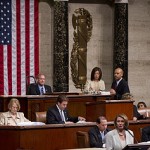 The national debt has grown by $3.4 trillion dollars since Mr. Obama assumed office. Public debt now comprises 62% of the economy, a percentage predicted by some experts to grow to 87% within ten years. Should we be worried that our entire way of life is going to disappear in a puff of insolvency? That’s for each American to decide for themselves but, once again, the political class in Washington DC are having a showdown over whether or when to raise the Federal debt limit. When a nation is mortgaged to the hilt like the United States, this question is a pretty big deal indeed.
The national debt has grown by $3.4 trillion dollars since Mr. Obama assumed office. Public debt now comprises 62% of the economy, a percentage predicted by some experts to grow to 87% within ten years. Should we be worried that our entire way of life is going to disappear in a puff of insolvency? That’s for each American to decide for themselves but, once again, the political class in Washington DC are having a showdown over whether or when to raise the Federal debt limit. When a nation is mortgaged to the hilt like the United States, this question is a pretty big deal indeed.
Believe it or not, the government cannot simply place itself into unlimited debt on a whim. Each year Congress must approve a higher limit before the powers that be go off on another money raising and spending spree. Most of the time, approval of a new, higher, Federal debt limit is merely a rubber stamp process, but, every once in a while, matters get testy, like they are this year. It happened in 1995 and again in 2002. Though not necessarily beholden to one party or another, this time around, Republicans are threatening to not approve a new debt limit without major spending cuts by the administration.
The Treasury Secretary has circulated a letter warning that refusal to act would result in a “significant and long-lasting tax on Americans,” would cause “home values to decline,” “reduce retirement savings,” and “produce business failures on a significant scale.” He goes on to allege the damage to the economy would be catastrophic.
Despite the rhetoric, the government will not slam to a screeching halt immediately upon reaching the Federal debt limit. In previous showdowns, a matter of months have passed before an agreement between the parties was reached, with no real discernible short or long term damage to the economy. Congress usually approves short-term, smaller limit increases while negotiations progress. The interesting thing to watch this time around is whether or not Republicans got the message sent by voters who supported Tea Party candidates to a frightening extent (at least when viewed by the establishment GOP voters) in the recent elections.
Some Republican leaders are talking tough, making us wonder if, this time around, they’ll dig in their heels far enough to actually receive significant cuts and spending control concessions from an administration seemingly hellbent on discovering exactly how many zeros can be tacked onto that number signifying the national debt.
Stay tuned. It’s going to be fun.
The American Monetary Association Team
Flickr / Leader Nancy Pelosi

